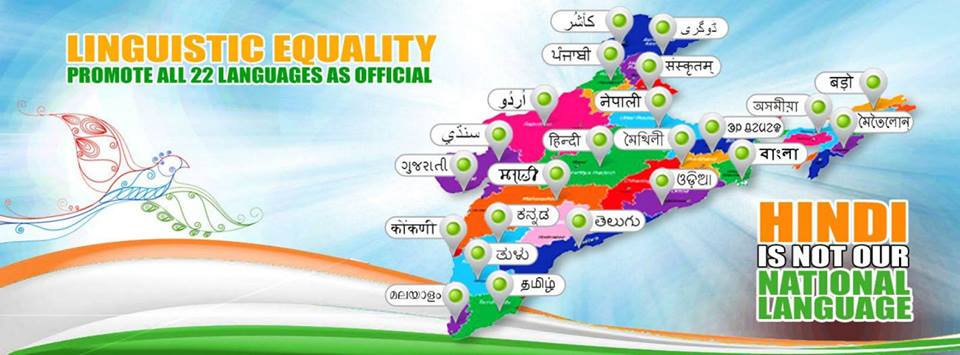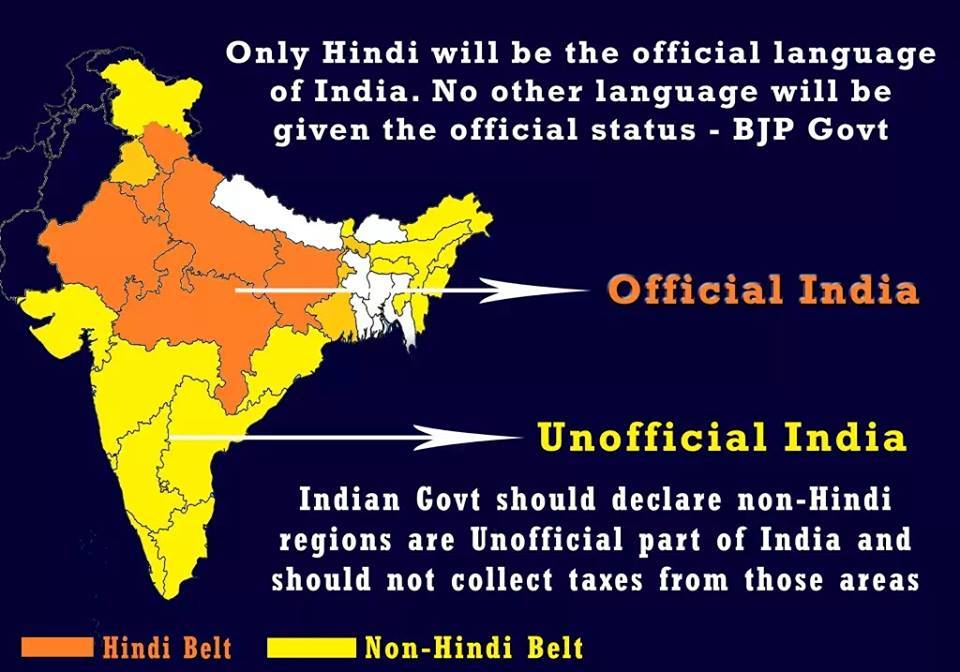During this year's Independence Day celebrations in India, a group of Twitter users launched a campaign [2] to promote greater linguistic equality in the country. As a result, the hashtag #StopHindiImposition [3] started trending nationwide.
#stophindiimposition [4] pic.twitter.com/WnHn7DrHSc [5]
— Arun kumar Ganesan (@badts7bio) August 16, 2015 [6]
Hindi is of no use to us…Native +English language is working well ,it is the northies who refuse to learn English #stophindiimposition [4]
— Nanda Karthik (@NandaAssassin) August 16, 2015 [7]
Participants in this campaign are also demanding that the government amend India's Official Language Act and declare Tamil, Telugu, Kannada, Bengali, Marathi, and other languages to be India's official languages.
According to census data from 2001 [8], the most common languages spoken in India after Hindi are Bengali, Telugu, Marathi, and Tamil, whose speakers constitute about 30 percent of the population. In other words, each of these languages has more native speakers than many European languages and each state where these languages are spoken is bigger than most European countries.
The campaign on Twitter began with the Bengaluru-based Facebook group Promote Linguistic Equality [1], which has roughly 4,000 Facebook followers. The group says the policies of the Indian Government favor the Hindi language, ignoring rights of other languages. Promote Linguistic Equality also states that [9]:
The purpose of this Twitter Campaign is to demand the Indian Union Govt to Promote Linguistic Equality & #StopHindiImposition on Non Hindi Speaking States.
A nation with a long history of heated language politics
The Anti-Hindi Imposition protest [10] is a not a new phenomenon in India, and has in fact existed for several decades. In 1937, the Indian National Congress tried to impose Hindi education [10] in the schools during the Madras Presidency (which the public vehemently opposed for nearly three years). In 1940, the British Governor of Madras, Lord Erskine, removed Hindi education from schools.
During the 1949 debate in India's Constituent Assembly about the country's official language, T.A. Ramalingam Chettiar, representing Madras, once warned [12] that there would be bitter consequences, if officials imposed Hindi as a national langauge. Due to staunch opposition from the members of South India, the assembly dropped the plan to introduce Hindi or Sanskrit as India's national language.
In 1965, the Indian government tried to introduce a Hindi-only policy, which provoked widespread protests and riots across Madras. Later that year, Indian Prime Minister Lal Bahadur Shastri gave assurances that local officials would continue to use English as the country's official language, so long as non-Hindi-speaking states want it. In 1967, Madras also witnessed significant political changes, as the Congress party was defeated [13] and DMK came to power for the first time.
It was in 1967 that the Indian government introduced the three-language formula, [14] making Hindi compulsory in schools, even in Non-Hindi-speaking states. It lead to strong protests in South India, and eventually the Legislative Assembly of Madras State (Tamil Nadu) scrapped the three-language formula and introduced a two-language formula, stating that no language other than Tamil and English could be used in the state's public spaces, government administration, or educational institutions.
Anti-Hindi imposition protests were renewed recently when the new government under the Bharatiya Janata Party formed in 2014. The government, which strongly favors Hindi, decreed [15] that “government employees and officials of all ministries, departments, corporations, or banks, who have made official accounts on social networking sites, should use Hindi, or both Hindi and English, but give priority to Hindi.” All political parties in Tamil Nadu strongly opposed the measure.
Why no award and incentive for non Hindi book author and translator while giving incentive for Hindi #stophindiimposition [4]
— sivadoss (@sivadoss007) August 16, 2015 [16]
Tensions brought on by new waves of migration
Stop Hindi Imposition [17], another Chennai-based Facebook group actively promoting linguistic rights, condemns the attitude [18] of some of the Hindi speakers who are moving into the city, who often expect the local population to be well versed in Hindi.
On Facebook, Ganesh Velusami writes [18], “Will [the Hindi speaker] lament that people around him don't speak Hindi, if he were to have gone to [the] US for work? Why then this imperialistic attitude while in India alone? Because he has been brainwashed that India has one national language of first class importance: Hindi and other regional languages of the second class people.”
Sandeep Kambi posted a picture on Twitter, and asks [19]
Why should clean india ad in Bengaluru be in Hindi? #stopHindiImposition [20] pic.twitter.com/4BQP7px3p8 [21]
— sandeepkambi (@sandeepkambi) August 16, 2015 [19]
Most non-Kannadigas in Bengaluru feel they can get by knowing little or no Kannada at all, writes Sriram Vittalamurthy.
Twitter user Vashant Shetty [22] raises a question:
Chennai to Coimbatore Train reservation list only in Hindi/English. No tamil. Why? #StopHindiImposition [23] pic.twitter.com/OCaXjWrqfW [24]
— Vasant Shetty (@vasantshetty81) August 15, 2015 [22]
Blogger Vignesh Raj complains [25]:
I can remember my flight from Thiruvananthapuram to Chennai by Air India. The safety announcements and other important announcements were only in Hindi and English in a region where over 90% customers know either Tamil or Malayalam or both. How fair is to make ‘ceremonial’ announcements in a region where both languages are foreign? I flew with British Airways from London Heathrow to Chennai. As I was greeted by the Air hostess I heard a welcome message ‘ British Airways ungalai anbudan varavaerkirathu (Welcomes You)’ followed by announcements in English.
Aishik Saha, a student and Quora user, writes [26]:
The myth that Hindi is the national language of India has persisted, and been propagated by the mainstream and alternative media for a long time. Those, who have pointed this out are often shouted down by our ultra-nationalists as anti-national or anti-Hindu.
It’s not just in Bengaluru or Chennai; the imposition of Hindi is occurring in almost every part of the country.
In the past few years, due to an economic boom in southern states, many people from northern parts of the country have begun migrating to the south. But many of these people, especially in cities like Bengaluru and Hyderabad, are reluctant to learn those states’ official languages [27], and instead lean on the locals to learn Hindi.
Penetration of Hindi is highly visible in the non-Hindi-speaking states like Karnataka, Maharashtra, West Bengal, and Telangana. This phenomenon is also present to an extent in Tamil Nadu, Kerala, and Andhra Pradesh.
A matter of social justice
The 1976 Official-Languages Rules of the Indian Constitution [28] that ensures Hindi won't be used officially for any purpose in Tamil Nadu. Reality is another matter, however. Even basic day-to-day information and services in banks, railway stations, and government offices are often offered only in Hindi or English, leading many locals to complain [29] that they're being denied their basic rights.
Preethi Sridhara, a Quora user, observes [30]:
Kids are being taught Hindi from the first standard. There is absolutely no need of Hindi there. Then why? Why is the government shoving Hindi down their throat?
She continues:
If everybody wants a neutral language, let's go for English. Everybody understands English, right? But no, my friends are being forced to conduct meetings in Hindi. Now isn't that a little unfair?
S. Vallish Kumar writes [31]:
Flawed language policy adopted by the Union Government of India, ever since the current political India was formed. The prolonged special treatment to Hindi by the Union Government of India, is what has caused the perception that everything related to Union Government must have Hindi in it.
Last year, E.M. Sudarsana Natchiappan, a member of parliament, authored a resolution to declare Tamil an official language [32]. Union Minister of State Haribhai Parathibhai Chaudhary rejected the legislation, saying that Articles 343-351 of the Indian Constitution declare that only Hindi and English [33] are the country's official languages.
As it happens, Indian languages like Tamil enjoy official-language status in Sri Lanka and Singapore [34]. Also, Bengali and Nepali are official languages in Bangladesh and Nepal, respectively, but they are denied the same status in India, where vast majority of these languages’ native speakers live.
On Twitter, Mithun says [35]:
@harshkn [36] Yes. I am a Tamil and I love Hindi as a language. But I hate the Hindi imposition! Tamil is enough in Tamil Nadu; not Hindi.
— மிதுன் (@mithunio) August 15, 2015 [35]
“Aggressive Hindi propaganda by the Hindi centric Central Govt’s. and also to an extent Bollywood Movies, have created a false ego among some North Indians (not all) that Hindi is the supreme Indian language,” writes [27] Quora user Sudhindra Sanjeev.
Prassanna LM, one of the organizers of the #StopHindiImposition campaign, demands [2]:
Indians can enjoy true independence only when all Indians and their languages are given equal status. Otherwise, non-Hindi speakers will remain as second class citizens. We demand that all 22 languages of union be declared as official languages under the 8th Schedule of the Constitution.
Though India's mainstream media has often portrayed anti Anti-Hindi-Imposition protests as isolated to Tamil Nadu, the movement has also enjoyed support in Karnataka, Maharashtra, and West Bengal, where Twitter users have echoed calls for linguistic equality in India.

